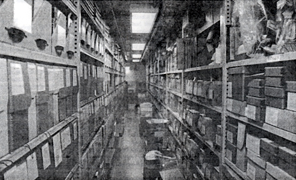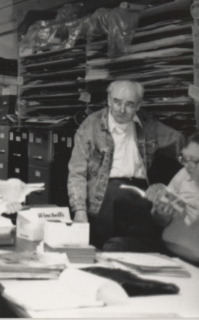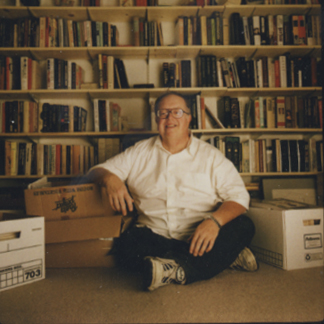Difference between revisions of "Jean-Nickolaus Tretter Collection"
(table +table) |
|||
| (10 intermediate revisions by 3 users not shown) | |||
| Line 2: | Line 2: | ||
| − | Jean-Nickolaus Tretter has collected Pride Guides, community newspapers, activist buttons, and other items of GLBT interest since his return from serving as a linguist in the Vietnam War. Already involved with F.R.E.E., Twin Cities Pride, other community organizations by 1972, Tretter’s interest in GLBT history and culture intensified at the University of Minnesota. As a student from 1973-76, Tretter unsuccessfully attempted to study Gay and Lesbian Anthropology. At the time, University staff assured him that no such thing existed. | + | {{unprotected}} |
| − | + | {| {{prettytable}} | |
| − | + | ! | |
| − | + | ! | |
| + | |- | ||
| + | | Jean-Nickolaus Tretter has collected Pride Guides, community newspapers, activist buttons, and other items of GLBT interest since his return from serving as a linguist in the Vietnam War. Already involved with [[F.R.E.E.]], the [[Twin Cities Pride Festival]], and other community organizations by 1972, Tretter’s interest in GLBT history and culture intensified at the University of Minnesota. As a student from 1973-76, Tretter unsuccessfully attempted to study Gay and Lesbian Anthropology. At the time, University staff assured him that no such thing existed. | ||
| + | | [[Image:Svc_tretterpresent.jpg]]<div style="text-align: center;"><small>'''Tretter's Collection at Elmer Andersen Library. Courtesy of the Jean-Nickolaus Tretter Collection in GLBT Studies.'''</small> | ||
| + | </div> | ||
| + | |} | ||
{| {{prettytable}} | {| {{prettytable}} | ||
! | ! | ||
! | ! | ||
|- | |- | ||
| − | | [[Image:Svc_trettkemp.jpg]] <div style="text-align: center;"> | + | | <div style="text-align: center;"> |
| + | [[Image:Svc_trettkemp.jpg]] | ||
| + | </div> <div style="text-align: center;"> | ||
'''<small>Jean-Nickolaus Tretter (seated) and Jim Kepner at the One Archives in Los Angeles. Courtesy of the Jean-Nickolaus Tretter Collection.</small>''' | '''<small>Jean-Nickolaus Tretter (seated) and Jim Kepner at the One Archives in Los Angeles. Courtesy of the Jean-Nickolaus Tretter Collection.</small>''' | ||
</div> | </div> | ||
| − | | Intent on proving them wrong, Tretter dropped out and studied the history of queer life on his own. His collection habits inspired word-of-mouth publicity and, in 1982, it led to a chance meeting with none other than Jim Kepner, founder of the One Archives in Los Angeles. The two struck an instant chord, and remained good friends until Kepner’s death in 1997. Tretter’s mentor encouraged his archival aspirations, and the Tretter Collection began to greatly increase in size. It included thousands of books, periodicals, artwork, and other objects by the late 1990s—filling most of his two-bedroom apartment in St. Paul. | + | | Intent on proving them wrong, Tretter dropped out and studied the history of queer life on his own. His collection habits inspired word-of-mouth publicity and, in 1982, it led to a chance meeting with none other than Jim Kepner, founder of the One Archives in Los Angeles. |
| + | |||
| + | |||
| + | |||
| + | |||
| + | The two struck an instant chord, and remained good friends until Kepner’s death in 1997. Tretter’s mentor encouraged his archival aspirations, and the Tretter Collection began to greatly increase in size. It included thousands of books, periodicals, artwork, and other objects by the late 1990s—filling most of his two-bedroom apartment in St. Paul. | ||
| + | |||
| − | The University of Minnesota changed its stance on GLBT history in little over 20 years. GLBT leaders at the “U” approached the University of Minnesota Libraries after the department announced plans to build a new archival library on the West Bank campus in 1999. | + | The University of Minnesota changed its stance on GLBT history in little over 20 years. GLBT leaders at the “U” approached the University of Minnesota Libraries after the department announced plans to build a new archival library on the West Bank campus in 1999. |
|} | |} | ||
{| {{prettytable}} | {| {{prettytable}} | ||
| Line 23: | Line 36: | ||
! | ! | ||
|- | |- | ||
| − | | | + | |After lengthy negotiations—and with support of the new library’s namesake, former Governor Elmer L. Anderson—the Tretter Collection moved into Andersen Library’s climate-controlled caverns. These caverns were dug into the bluffs of the Mississippi River, and are some of the finest archival storage spaces in the world. |
| − | + | ||
| − | |||
| − | |||
| − | |||
The University’s support provided Tretter’s Collection with proper resources; it has grown to include tens of thousands of materials that represent 4,000 years of history. In an ironic twist, Tretter now works for the University tending to his collection. | The University’s support provided Tretter’s Collection with proper resources; it has grown to include tens of thousands of materials that represent 4,000 years of history. In an ironic twist, Tretter now works for the University tending to his collection. | ||
| + | | <div style="text-align: right; direction: ltr; margin-left: 1em;"> | ||
| + | [[Image:Svc_trettapt.jpg]] | ||
| + | </div><div style="text-align: right; direction: ltr; margin-left: 1em;"> | ||
| + | |||
| + | <small>'''Photograph of Jean-Nickolaus Tretter in his apartment'''</small> | ||
| + | |||
| + | <small>'''as his collection moved to Elmer Anderson Library, 1999.'''</small> | ||
| + | |||
| + | <small>'''Courtesy of the Jean-Nickolaus Tretter Collection.'''</small> | ||
| + | </div> | ||
| + | |} | ||
---- | ---- | ||
| − | This page | + | ==This entry is part of:== |
| + | == [[Minneapolis/St. Paul, MN: 100 Queer Places in Minnesota History, (1860-2010)]]== | ||
| + | ---- | ||
| + | |||
| + | |||
| + | The information used in this page is available at the Tretter Collection's website: http://special.lib.umn.edu/rare/tretter.phtml | ||
| + | |||
| + | Part of [[Minneapolis/St. Paul, MN: 100 Queer Places in Minnesota History, (1860-1969), (1969-2010)]] | ||
Latest revision as of 05:27, 2 February 2012
Tretter Collection
| Jean-Nickolaus Tretter has collected Pride Guides, community newspapers, activist buttons, and other items of GLBT interest since his return from serving as a linguist in the Vietnam War. Already involved with F.R.E.E., the Twin Cities Pride Festival, and other community organizations by 1972, Tretter’s interest in GLBT history and culture intensified at the University of Minnesota. As a student from 1973-76, Tretter unsuccessfully attempted to study Gay and Lesbian Anthropology. At the time, University staff assured him that no such thing existed. |  Tretter's Collection at Elmer Andersen Library. Courtesy of the Jean-Nickolaus Tretter Collection in GLBT Studies.
|
| Jean-Nickolaus Tretter (seated) and Jim Kepner at the One Archives in Los Angeles. Courtesy of the Jean-Nickolaus Tretter Collection. |
Intent on proving them wrong, Tretter dropped out and studied the history of queer life on his own. His collection habits inspired word-of-mouth publicity and, in 1982, it led to a chance meeting with none other than Jim Kepner, founder of the One Archives in Los Angeles.
|
| After lengthy negotiations—and with support of the new library’s namesake, former Governor Elmer L. Anderson—the Tretter Collection moved into Andersen Library’s climate-controlled caverns. These caverns were dug into the bluffs of the Mississippi River, and are some of the finest archival storage spaces in the world.
|
Photograph of Jean-Nickolaus Tretter in his apartment as his collection moved to Elmer Anderson Library, 1999. Courtesy of the Jean-Nickolaus Tretter Collection. |
This entry is part of:
Minneapolis/St. Paul, MN: 100 Queer Places in Minnesota History, (1860-2010)
The information used in this page is available at the Tretter Collection's website: http://special.lib.umn.edu/rare/tretter.phtml
Part of Minneapolis/St. Paul, MN: 100 Queer Places in Minnesota History, (1860-1969), (1969-2010)

